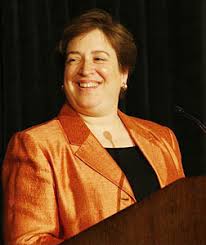
Not to name drop or to attempt to sound more worldly and sophisticated than I really am, but time and circumstance once placed me in a tour group in Vilnius, Lithuania, in July, 1999. And as part of that experience, I was led around sites of Jewish historical significance by a rabbi/scholar who remarked, in words I still recall, that the inscription on a monument was significant in terms of "Jewish theology, to the extent there is such a thing."
"I'd like to offer here... a lament for the passing of American Protestantism," American religion scholar Diana Butler Bass wrote on BeliefNet.com about Obama's decision to nominate Kagan, a Jew.
That is almost certainly overstated. In fact, I think I'll say it's anti-Semitic, just for the hell of it. And speaking of contradictions in terms, how about "American religion scholar." Can one actually be a "scholar" about religious matters? That would seem to have as much meaning as "Jewish theology." If one is "studying" something completely made up, how can there be any scholarship to it? It would be like writing a doctoral thesis on "Puff the Magic Dragon." You can do it, but what do you really know when you're done that you didn't know when you started?
As far as Elena Kagan's credentials are concerned, not surprisingly President Obama has chosen someone who is not ideologically controversial. She's kind of liberal, kind of centrist, sort of like the President himself. Not a boat-rocker, not a firebrand. Sometimes appointees surprise the Presidents who appoint them (such as the retiring Stevens, or Souter, or, most notably, Earl Warren), but I doubt that's going to happen here. The magnificent days of judicial trailblazing are over now, and Elena Kagan should fit right into the new style of mostly deferring to the Executive Branch except when it's just so far over the line (Bush's attempt to eliminate habeas corpus, for example) that even the somnolent, pro-corporate Supreme Court says whoa.
Attempts to compare Kagan to Bush's nomination of his office wife, Harriet Miers, are absurd. Harriet's biggest job prior to nomination and her job in the White House had been as President of the Texas State Bar, a largely ceremonial, inconsequential position mainly attributable to political connections. Kagan has been Dean of the mighty Harvard Law School and Solicitor General of the United States, which means she's been a working lawyer. Miers let her bar membership lapse for nonpayment of dues while she lolled around Bush's White House making ditzy remarks.
Kagan's obviously real smart and she's got a nice smile, and it's just possible she's our third atheist on the bench. Catholics tend not to be atheists, in my experience, and their religiosity often colors their view of the "liberal social agenda," as with Scalia, for example, who is a "Strict Constructionist" only in the sense that Antonin interprets the Constitution in strict conformity with Deuteronomy.
In other words, I think Elena is just fine, and who really cares? Obama could do a lot worse, as Bush tried to do in making a laughingstock of the whole nomination process. I mean, really: Harriet Miers? Why not Matlock? Why even insist that nominees be real people? Kagan will move the Court more toward normality, away from the coven of weirdos represented by Roberts, Alito, Scalia and Thomas. Good enough. That's my new standard of expectations with this Administration: does the latest action make things weirder or more tolerable?
Kagan makes things more tolerable. Case closed.


No comments:
Post a Comment